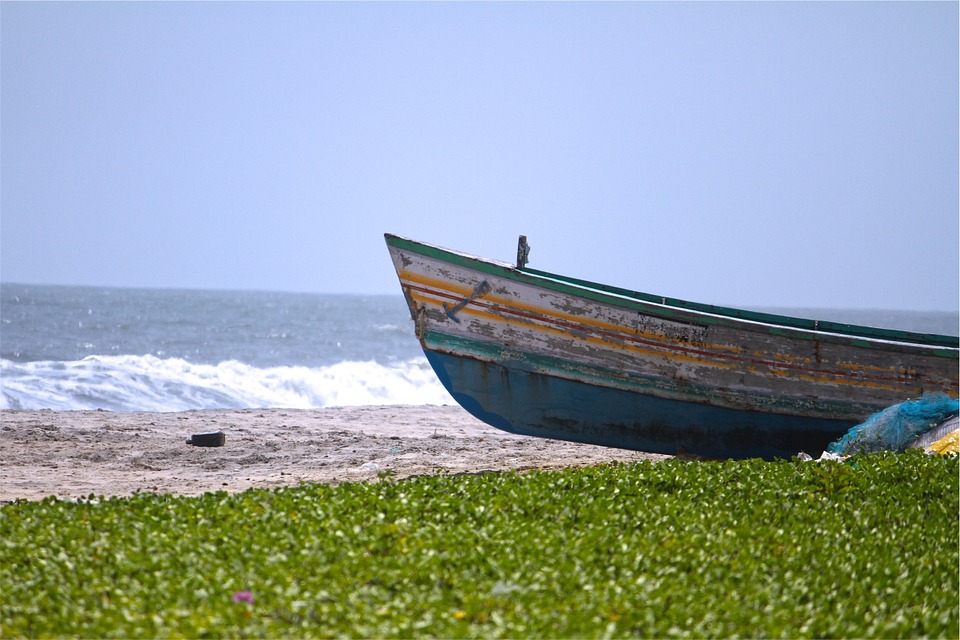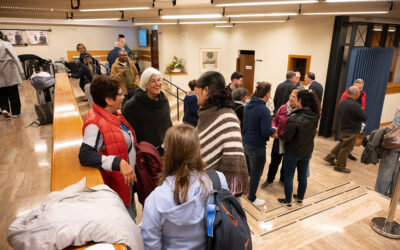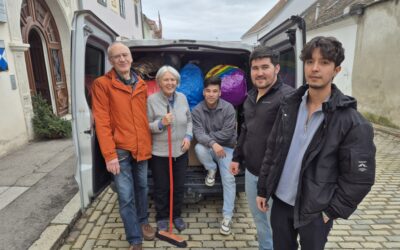 Migrants We watched the first disembarkations in our cities. Today the initial receptions were moved to the courtyard in front of the municipal gym next to our home, and so from my balcony I could watch the long lines of migrants with bare feet or in singlets and shorts, waiting to pass through the first checkpoint. Suddenly it became very windy and the temperature dropped. I could no longer stand still. I had to do something for these brothers already harshly put to the test. I went out and noted an acquaintance among the members of the surveillance team, and learned from him that they were short of clothing. I returned home, and with my husband, put together what we thought could be useful, and after a few trips, delivered all to his friend, to be distributed. Also other acquaintances who we had notified, added other clothing. It had started to rain, but almost all had now received some clothing. Many smiled at us saying “grazie” (thank you in Italian), perhaps one of the few words they knew. Raffaella (Italy) Fund gathering When I found out that the father of a big and poor family needed an urgent operation but did not have the means to pay for it, I felt Jesus was prodding me to do something. With some friends, I made the effort to start raising funds, involving also our colleagues at work. Once I gathered the necessary amount, I accompanied the sick man to the hospital, and paid for the relevant treatment. The operation was a success. I can’t say if the joy of that family was greater than ours. I think that also small gestures contribute to building peace. N. Y. (Jordan) Neighbours The neighbour in front of our house was sick and needed many treatments. Her husband had gone on pension ahead of time to take care of her. My husband and I felt we had to do something and became their friends. While conversing with them one day, we ended up talking about our faith. We found out that she had stopped going to Church due to the incorrect behaviour of some priests; the husband instead, did not have much time for anything else due to work. When I recounted how God had come into my life, my neighbor started to ask many questions, and deduced that perhaps, illness itself could be a bridge that God was offering to her, as a means to move away from the heavy and sad atmosphere reigning in that house. She also started to give more care more to her looks. One evening her husband confided: «There is no medicine that can give serenity, and for some time now we are exploiting this asset». L. M. (France) BY: Oreste Paliotti
Migrants We watched the first disembarkations in our cities. Today the initial receptions were moved to the courtyard in front of the municipal gym next to our home, and so from my balcony I could watch the long lines of migrants with bare feet or in singlets and shorts, waiting to pass through the first checkpoint. Suddenly it became very windy and the temperature dropped. I could no longer stand still. I had to do something for these brothers already harshly put to the test. I went out and noted an acquaintance among the members of the surveillance team, and learned from him that they were short of clothing. I returned home, and with my husband, put together what we thought could be useful, and after a few trips, delivered all to his friend, to be distributed. Also other acquaintances who we had notified, added other clothing. It had started to rain, but almost all had now received some clothing. Many smiled at us saying “grazie” (thank you in Italian), perhaps one of the few words they knew. Raffaella (Italy) Fund gathering When I found out that the father of a big and poor family needed an urgent operation but did not have the means to pay for it, I felt Jesus was prodding me to do something. With some friends, I made the effort to start raising funds, involving also our colleagues at work. Once I gathered the necessary amount, I accompanied the sick man to the hospital, and paid for the relevant treatment. The operation was a success. I can’t say if the joy of that family was greater than ours. I think that also small gestures contribute to building peace. N. Y. (Jordan) Neighbours The neighbour in front of our house was sick and needed many treatments. Her husband had gone on pension ahead of time to take care of her. My husband and I felt we had to do something and became their friends. While conversing with them one day, we ended up talking about our faith. We found out that she had stopped going to Church due to the incorrect behaviour of some priests; the husband instead, did not have much time for anything else due to work. When I recounted how God had come into my life, my neighbor started to ask many questions, and deduced that perhaps, illness itself could be a bridge that God was offering to her, as a means to move away from the heavy and sad atmosphere reigning in that house. She also started to give more care more to her looks. One evening her husband confided: «There is no medicine that can give serenity, and for some time now we are exploiting this asset». L. M. (France) BY: Oreste Paliotti
Start again!
Start again!




0 Comments